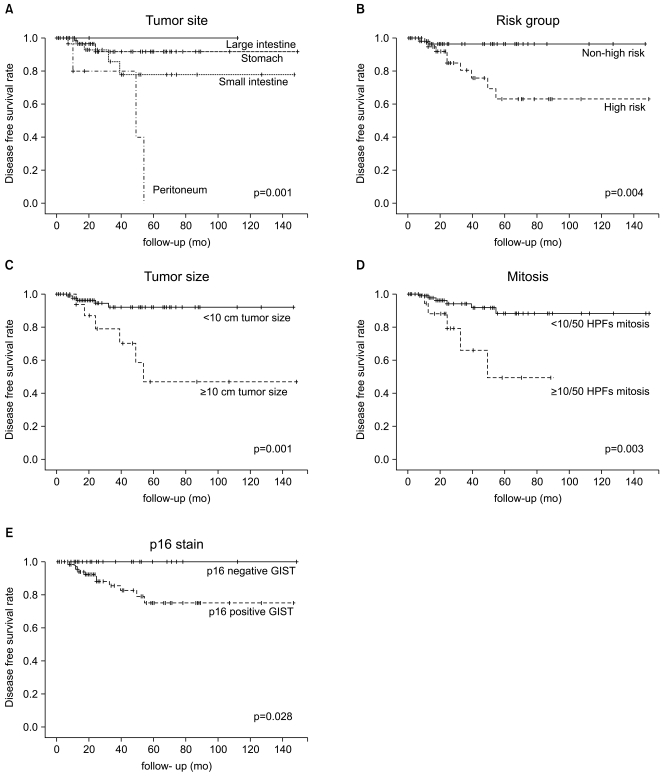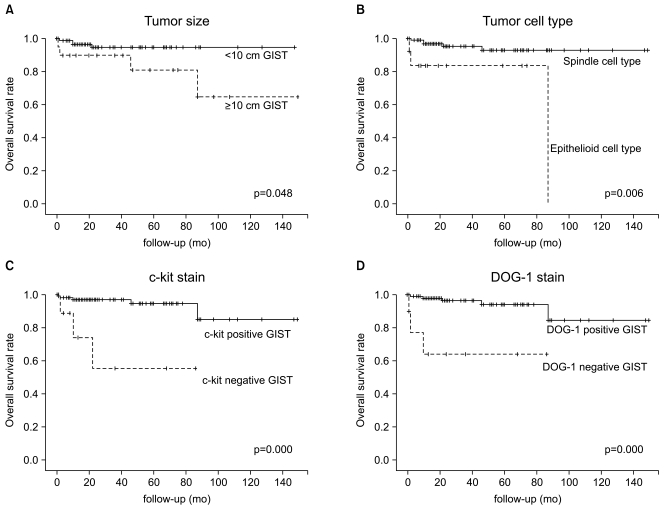Cancer Res Treat.
2010 Sep;42(3):135-143.
Clinicopathological and Immunohistochemical Features of Gastointestinal Stromal Tumors
- Affiliations
-
- 1Department of Pathology, Keimyung University School of Medicine, Daegu, Korea. yunakang@dsmc.or.kr
Abstract
- PURPOSE
The purpose of this study was to evaluate the clinicopathological features and immunohistochemical features of gastrointestinal stromal tumor (GIST), and specifically the expressions of platelet derived growth factor receptor A (PDGFRA), protein kinase C theta (PKC theta), discovered on GIST-1 (DOG-1), p16 and p27.
MATERIALS AND METHODS
Total 118 patients who underwent surgical resection for GIST at our institution between Jan 1997 and Dec 2007 were retrospectively studied. Immunohistochemical staining for c-kit, PDGFRA, PKC-theta, DOG-1, p16 and p27 was performed on a tissue microarray of the 118 GIST. The clinicopathologic parameters, the disease-free survival (DFS) and the overall survival rate were analyzed along with immunohistochemistry.
RESULTS
The immunohistochemical stains for c-kit, CD34, PKC-theta, PDGFRA, DOG-1, p16 and p27 were positive in 89.8%, 72.0%, 56.8%, 94.9%, 90.7%, 69.5% and 44.1% of the tumor samples, respectively. The immunohistochemical expression of c-kit was strongly correlated with PKC-theta (p=0.000), DOG-1 (p=0.000) and CD34 (p=0.002). The DFS rate was significantly decreased for the patients with peritoneal GIST, high risk GIST, > or =10 cm-sized GIST, > or =10 mitoses/50 high power fields (HPFs) and p16 positivity (p=0.001, p=0.004, p=0.001, p=0.003 and p=0.028). GISTs > or =10 cm, epithelioid tumor cell type, and c-kit, and DOG-1 negativity were significantly associated with shorter period of overall survival (p=0.048, p=0.006, p=0.000 and p=0.000).
CONCLUSION
The expression of p16 and no expression of c-kit and DOG-1 in GISTs, as well as peritoneal tumor site, high risk group, large tumor size, epithelioid tumor cell type and numerous mitoses, may be potentially prognostic factors for predicting worse outcome for patients who suffer from GIST.
MeSH Terms
Figure
Reference
-
1. Connolly E, Gaffney E, Reynolds J. Gastrointestinal stromal tumours. Br J Surg. 2003; 90:1178–1186. PMID: 14515284.
Article2. Fletcher C, Berman J, Corless C, Gorstein F, Lasota J, Longley B, et al. Diagnosis of gastrointestinal stromal tumors: a consensus approach. Int J Surg Pathol. 2002; 10:81. PMID: 12075401.
Article3. Miettinen M, Lasota J. Gastrointestinal stromal tumors-definition, clinical, histological, immunohistochemical, and molecular genetic features and differential diagnosis. Virchows Arch. 2001; 438:1–12. PMID: 11213830.4. Hirota S, Isozaki K, Moriyama Y, Hashimoto K, Nishida T, Ishiguro S, et al. Gain-of-function mutations of c-kit in human gastrointestinal stromal tumors. Science. 1998; 279:577–580. PMID: 9438854.5. Motegi A, Sakurai S, Nakayama H, Sano T, Oyama T, Nakajima T. PKC theta, a novel immunohistochemical marker for gastrointestinal stromal tumors (GIST), especially useful for identifying KIT-negative tumors. Pathol Int. 2005; 55:106–112. PMID: 15743318.
Article6. Sevinc A, Camci C, Yilmaz M, Buyukhatipoglu H. The diagnosis of C-kit negative GIST by PDGFRA staining: clinical, pathological, and nuclear medicine perspective. Onkologie. 2007; 30:645–648. PMID: 18063877.
Article7. Chompret A, Kannengiesser C, Barrois M, Terrier P, Dahan P, Tursz T, et al. PDGFRA germline mutation in a family with multiple cases of gastrointestinal stromal tumor. Gastroenterology. 2004; 126:318–321. PMID: 14699510.
Article8. West RB, Corless CL, Chen X, Rubin BP, Subramanian S, Montgomery K, et al. The novel marker, DOG1, is expressed ubiquitously in gastrointestinal stromal tumors irrespective of KIT or PDGFRA mutation status. Am J Pathol. 2004; 165:107–113. PMID: 15215166.
Article9. Pidhorecky I, Cheney RT, Kraybill WG, Gibbs JF. Gastrointestinal stromal tumors: current diagnosis, biologic behavior, and management. Ann Surg Oncol. 2000; 7:705–712. PMID: 11034250.
Article10. Sircar K, Hewlett BR, Huizinga JD, Chorneyko K, Berezin I, Riddell RH. Interstitial cells of Cajal as precursors of gastrointestinal stromal tumors. Am J Surg Pathol. 1999; 23:377–389. PMID: 10199467.
Article11. Rabin I, Chikman B, Lavy R, Sandbank J, Maklakovsky M, Gold-Deutch R, et al. Gastrointestinal stromal tumors: a 19 year experience. Isr Med Assoc J. 2009; 11:98–102. PMID: 19432038.12. Liu FY, Qi JP, Xu FL, Wu AP. Clinicopathological and immunohistochemical analysis of gastrointestinal stromal tumor. World J Gastroenterol. 2006; 12:4161–4165. PMID: 16830365.
Article13. Kim KM, Kang DW, Moon WS, Park JB, Park CK, Sohn JH, et al. PKCtheta expression in gastrointestinal stromal tumor. Mod Pathol. 2006; 19:1480–1486. PMID: 16892012.14. Isaac JC, Willmore C, Holden JA, Layfield LJ. A c-kit-negative gastrointestinal stromal tumor with a platelet-derived growth factor receptor alpha mutation. Appl Immunohistochem Mol Morphol. 2006; 14:52–56. PMID: 16540731.
Article15. Miettinen M, Lasota J. Gastrointestinal stromal tumors: review on morphology, molecular pathology, prognosis, and differential diagnosis. Arch Pathol Lab Med. 2006; 130:1466–1478. PMID: 17090188.
Article16. Fletcher JA, Rubin BP. KIT mutations in GIST. Curr Opin Genet Dev. 2007; 17:3–7. PMID: 17208434.
Article17. Heinrich MC, Corless CL, Duensing A, McGreevey L, Chen CJ, Joseph N, et al. PDGFRA activating mutations in gastrointestinal stromal tumors. Science. 2003; 299:708–710. PMID: 12522257.18. Heinrich MC, Corless CL, Demetri GD, Blanke CD, von Mehren M, Joensuu H, et al. Kinase mutations and imatinib response in patients with metastatic gastrointestinal stromal tumor. J Clin Oncol. 2003; 21:4342–4349. PMID: 14645423.
Article19. Joensuu H. Treatment of inoperable gastrointestinal stromal tumor (GIST) with Imatinib (Glivec, Gleevec). Med Klin (Munich). 2002; 97(Suppl 1):28–30. PMID: 11831069.20. Kim T, Lee H, Kang Y, Choe M, Ryu M, Chang H, et al. Prognostic significance of c-kit mutation in localized gastrointestinal stromal tumors. Clin Cancer Res. 2004; 10:3076. PMID: 15131046.
Article21. Huang HY, Huang WW, Lin CN, Eng HL, Li SH, Li CF, et al. Immunohistochemical expression of p16INK4A, Ki-67, and Mcm2 proteins in gastrointestinal stromal tumors: prognostic implications and correlations with risk stratification of NIH consensus criteria. Ann Surg Oncol. 2006; 13:1633–1644. PMID: 17013685.
Article22. Nemoto Y, Mikami T, Hana K, Kikuchi S, Kobayashi N, Watanabe M, et al. Correlation of enhanced cell turnover with prognosis of gastrointestinal stromal tumors of the stomach: relevance of cellularity and p27kip1. Pathol Int. 2006; 56:724–731. PMID: 17096729.
Article
- Full Text Links
- Actions
-
Cited
- CITED
-
- Close
- Share
- Similar articles
-
- Molecular and Clinicopathological Features of Gastrointestinal Stromal Tumors in Vietnamese Patients
- Classification and Clinical Evaluation of Gastrointestinal Stromal Tumor: Immunohistochemical Expression of CD117, CD34, alpha- Smooth Muscle Actin, S-100
- Gastrointestinal Stromal Tumors; Clinicopathological Features and Prognostic Factors
- Comparative Study of the Clinicopathologic Characteristics between Gastrointestinal Stromal Tumors Arising from the Stomach and Small Bowel
- Two Cases of Low Grade Endometrial Stromal Sarcoma



